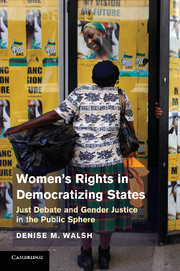Book contents
- Frontmatter
- Contents
- List of Figures and Tables
- Acknowledgments
- Abbreviations
- PART I JUST DEBATE
- PART II JUST DEBATE IN DEMOCRATIZING STATES
- 4 Just Debate Denied: Socialist and Post-socialist Poland
- 5 Just Debate Diverges: Regime Breakdown in Chile and South Africa
- 6 Just Debate Prevails: The Liberal Moment in South Africa
- 7 Just Debate Declines: Consolidation in South Africa
- PART III GENDER JUSTICE
- Bibliography
- Index
7 - Just Debate Declines: Consolidation in South Africa
Published online by Cambridge University Press: 06 December 2010
- Frontmatter
- Contents
- List of Figures and Tables
- Acknowledgments
- Abbreviations
- PART I JUST DEBATE
- PART II JUST DEBATE IN DEMOCRATIZING STATES
- 4 Just Debate Denied: Socialist and Post-socialist Poland
- 5 Just Debate Diverges: Regime Breakdown in Chile and South Africa
- 6 Just Debate Prevails: The Liberal Moment in South Africa
- 7 Just Debate Declines: Consolidation in South Africa
- PART III GENDER JUSTICE
- Bibliography
- Index
Summary
“Instead of empowerment, we have a sophisticated process of disempowerment.”
Vivienne Taylor, CGE Commissioner, 1999“An unthinking, uncritical, kowtowing party-line toeing is fatal to a vibrant democracy.”
Archbishop Desmond Tutu, 2004INTRODUCTION
Feminists have widely celebrated South African successes. In 1994, more than 19 million South Africans went to the ballot box and ended an apartheid regime that also was deeply conservative on women's rights. The Government of National Unity, which was committed to non-racism and non-sexism, took its place. That new government brought 111 diverse women into parliament. A core group of talented women MPs working with an array of women's organizations in civil society helped pass a remarkable series of laws that included a gender equality clause in the final constitution, the right to abortion, domestic violence legislation, affirmative action programs that targeted black women, a new maintenance act, and customary marriage reform. State support for gender justice on the scale that occurred in South Africa is quite rare in democratizing states. Instead, outcomes tend to be moderate as in Latin America, or limited as in Central and Eastern Europe. Although South Africa was an exception to this trend, its exceptionalism did not last. At the beginning of the twenty-first century these advances stopped. Why?
As discussed in Chapter 3, gender scholars have offered a number of explanations for this outcome. Scholars of South African gender politics point to weaknesses among women's organizing as well as problems with the electoral system.
- Type
- Chapter
- Information
- Women’s Rights in Democratizing StatesJust Debate and Gender Justice in the Public Sphere, pp. 185 - 216Publisher: Cambridge University PressPrint publication year: 2010



